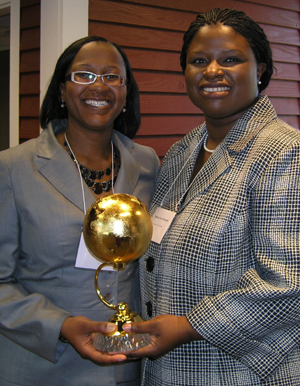The University of St. Thomas School of Law's Community Justice Project, in partnership with the St. Paul chapter of the NAACP, has received the 2010 Jimmy and Rosalynn Carter Partnership Award for Campus-Community Collaboration.
Minnesota Supreme Court Justice Alan Page presented the $10,000 national award, which honors outstanding campus-community partnerships, June 17 at Minnesota Campus Compact’s 2010 Summit convening higher education leaders from across Minnesota. Page also was the keynote speaker at the Summit.
This is the third time that Minnesota Campus Compact has presented the award in conjunction with the Campus Community Partnership Foundation. Other finalists for this year's Carter Award were Augsburg College’s Campus Kitchen Project and the University of Minnesota's Cedar Humphrey Action for Neighborhood Collaborative Engagement (CHANCE) project.

Clinical Law Fellow Artika Tyner (left), and Associate Professor Nekima Levy-Pounds, director of the Community Justice Project, pose with the Jimmy and Rosalynn Carter Partnership Award for Campus-Community Collaboration June 17. (Photo credit: Hamline University.)
The Community Justice Project, directed by St. Thomas law professor Nekima Levy-Pounds, and the NAACP's St. Paul chapter have worked together since 2006 to challenge laws and policies that have a negative impact on communities of color. They have engaged law students, local youth and disenfranchised community members to address civil rights issues, increasing dialogue and improving relationships between law enforcement agencies and communities of color.
Among the results of the partnership:
- The project and the chapter laid the foundation for a partnership with the Aurora-St. Anthony Neighborhood Development Corp. to start Brotherhood Inc., a support system for young African American men who had been involved in gangs or the law enforcement system. Brotherhood Inc. is modeled after Homeboy Industries, a successful program created in 1988 to combat gang violence in Los Angeles.
- They prepared a memo to the St. Paul city attorney regarding the overuse of the "Obstructing Legal Process" charge where African Americans are concerned. As a result, the city attorney retrained prosecutors, which doubled the dismissal rate of cases being prosecuted.
- They advocated for legislative change regarding Minnesota's gang databases, resulting in major changes in Ramsey County data collection procedures, which now include a parental notification provision when children are added to the databases.
In addition to recognizing outstanding campus-community collaborations, the Carter Partnership Award is given to:
- Increase the number and the effectiveness of campus-community partnerships and promote college/university citizenship
- Encourage cooperation among education, community, government and business leaders on critical social and economic issues
- Increase public awareness of and support for campus-community partnerships.
The award is named for President and Mrs. Carter as a tribute to their lifelong efforts to develop and support safe, healthy, and caring communities throughout the world.
Also honored for civic engagement at the June 17 event were three other programs with St. Thomas ties: the UST Tutor-Mentor Program, celebrating its 20th year, which pairs St. Thomas students with elementary and secondary students; the Interprofessional Clinic for Counseling and Legal Services run by the university's schools of Law, Professional Psychology and Social Work, which provides counseling and legal clinics for diverse and underserved populations; and Cristo Rey Jesuit High School, which has worked with hundreds of St. Thomas students to encourage its students to achieve their goals and pursue a college education.






